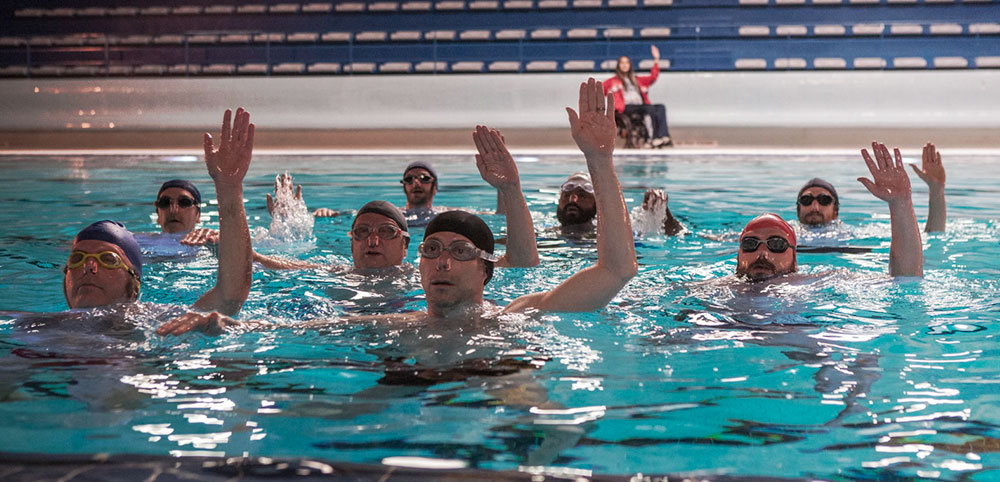Le Grand Bain
The decline of the male empire
Film. By immersing the dream team of French cinema in the chlorine of a municipal swimming pool, Gilles Lellouche succeeds in an excellent comedy on the end of the male domination.
By Jacques Braunstein

In recent years, Gilles Lellouche has become a central actor in French mainstream cinema (La French, Le sens de la fête, Plonger…). However, he started as an advertising director in the 90s. And he had already co-directed two feature films, the tarantinesque Narco with Guillaume Canet in 2004 and the sketch film The Players in 2012, with Dujardin and Canet again.
”Le Grand Bain start other things, and while its gestation is old, it is nevertheless a film post #MeToo.
Le Grand Bain, Gilles Lellouche’s first solo film, and the first film he made without appearing as an actor, is reminiscent of the two previous ones. It opens with a sequence at the edge of the cartoon that evokes the first and is hardly necessary. As if the director have to extract himself first out of his story, pay his debt to Tarantino, Fincher & co, before focusing on his object : the disarray of the contemporary male. The Players also showed disoriented men. Unequal but pleasant sometimes, embarrassing at other times, he followed some guys for whom sexual conquest was the last adventure. And even though they were pathetic most of the time, the movie seemed to absolve them. Provocative posters ended up discrediting the project by provoking the ire of feminists (which did not prevent it from totaling more than 2 million admissions).
Le Grand Bain start things over, and while its gestation is old, it is nevertheless a film post #MeToo. The men he presents live in the ruins of the male empire and stick your oar in. Benoît Poelvoorde is a small boss in bankruptcy, Matthieu Amalric an unemployed executive in depression, Jean-Hugues Anglade a rocker who never met with success and Guillaume Canet a hotheaded industrialist (to the point that having made his son stutter and to be left by his wife by martyring them). Each person personifies one of the twentieth century male totems, demonetized by contemporary society*. Let’s mention Philippe Katerine, the pool keeper who feels useless since the management of the pool is computerized and Félix Moati, a caregiver in a nursing home, who embody a new disqualified and interchangeable proletariat that has succeeded to the virile figure of the worker.
But Le Grand Bain avoids being a political film that asserts its truths. His idea of departure allows him to show all this by shifting the subject in the manner of English comedies like The Full Monty, The Chorus or Pride.
A former duo of synchronized swimming champions (Leila Bekhti became a paraplegic and Virginie Efira who sank into alcohol) offers these scrapped men to form one of the first men’s teams in the discipline. A little big, a little old, mold balls, hats and clappers, the fine flower of French cinema does not look at the edge of the pool… But the scenes are linked, sometimes funny, sometimes tender, sometimes grotesque. And the film just touches, always accomplice of his characters but never their illusions. A success !
*On notera d’ailleurs que Guillaume Canet poursuit le même genre de réflexion, sur un ton parfois plus agaçant, dans ses propres films comme Les petits mouchoirs, Rock’N’Roll et bientôt Nous vieillirons ensemble (le 27 mars en salle) qui ont en commun d’avoir Gilles Lellouche comme acteur.
*It should be noted that Guillaume Canet is pursuing the same kind of thinking, sometimes more annoyingly, in his own films such as Little White Lies, Rock’N’Roll and soon Nous finirons ensemble (March 27 in theaters) who have in common to have Gilles Lellouche as an actor.


